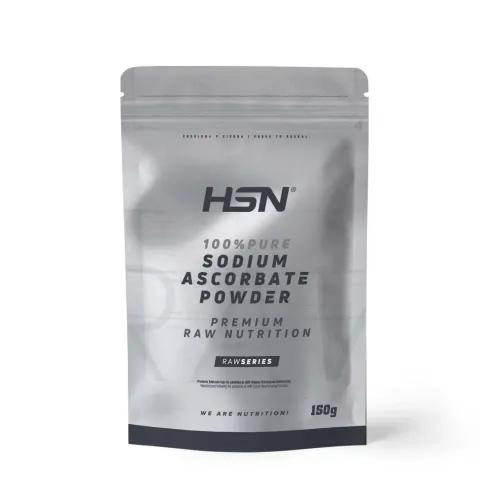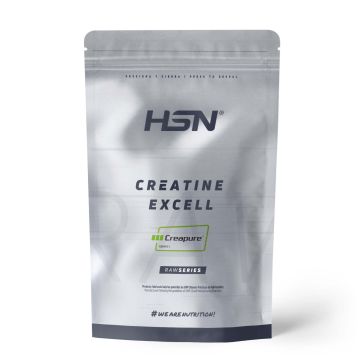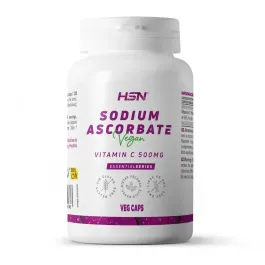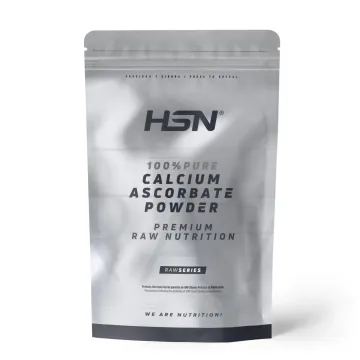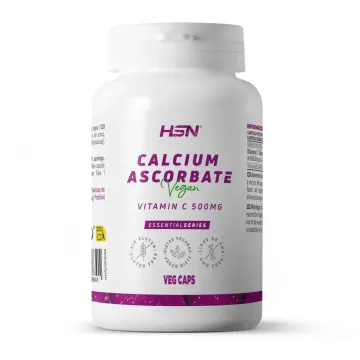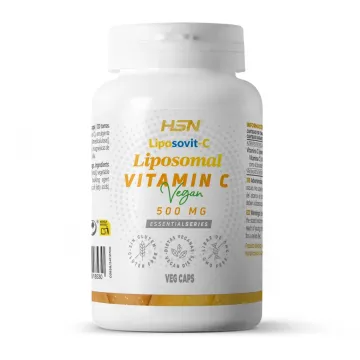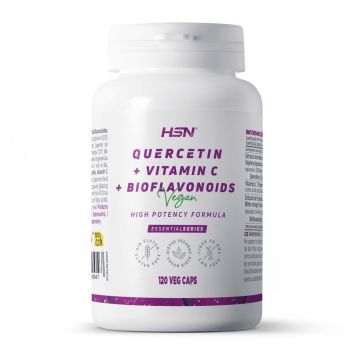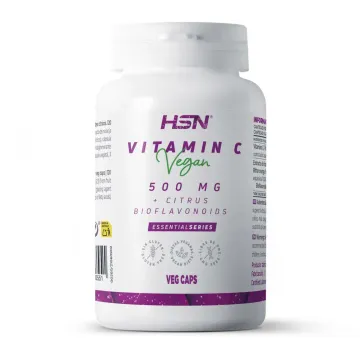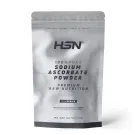- Vitamin C in sodium salt form - ionic version of ascorbic acid (ascorbate).
- 100% pure powder format - Ideal for precise dosage control.
- Provides a high concentration of vitamin C - 88% of the total composition.
- More resistant to degradation than pure vitamin C - Non-acidic version.
- Easy to mix in water - Less acidic taste than ascorbic acid - Can be combined with other supplements.
- 100% Pure line - RAW | Exclusively pure raw material | No additives or fillers.
Sodium Ascorbate - Stable Vitamin C
Sodium ascorbate (Vitamin C) powder from RawSeries is a powdered dietary supplement developed with a protected and non-acidic form of vitamin C, in its ionic version combined with sodium, known as sodium ascorbate.
Vitamin C is an essential nutrient for the human diet, as an inadequately low intake of vitamin C can lead to deficiency diseases such as scurvy; its beneficial properties stem from its powerful antioxidant effect, but one of its major issues is its high reactivity, which leads to rapid degradation. The sodium ascorbate form stabilizes vitamin C, providing greater protection against environmental factors and converting it into an alkaline, non-acidic version. Moreover, with our '100% Pure' RawSeries format, you can enjoy 100% sodium ascorbate, with 0% additives.
Sodium ascorbate is an excellent tool for supplementing the diet with vitamin C.
Sodium Ascorbate - No Additives of Any Kind
What is Sodium Ascorbate?
Sodium ascorbate is a form of vitamin C that presents it in an alkalinized form rather than an acidic one.
This is achieved by combining pure vitamin C, which is in the form of L-ascorbic acid, with sodium bicarbonate, a characteristically basic compound (in relation to pH) that alkalinizes and stabilizes the vitamin.
Sodium ascorbate is the result of heating sodium bicarbonate in combination with pure vitamin C in a process that involves different stages of filtration and centrifugation to obtain a high-quality, stable raw material with a good supply of this essential nutrient.
What are the Differences Between Sodium Ascorbate and Pure Vitamin C?
Sodium ascorbate is a form of vitamin C that loses its acidic condition by mixing with a characteristically basic compound, such as sodium bicarbonate.
Nutritionally, the advantage of sodium ascorbate is that it is a stabilized form, which, thanks to the presence of sodium and the conversion of vitamin C into its ionic ascorbate form, provides much better protection against environmental factors.
And it is not acidic, which, while not an inherent benefit, is significant in powder form, as acid can cause dental problems for sensitive individuals. Sodium ascorbate, regulated by bicarbonate, is not as aggressive on enamel as acids, like pure vitamin C.
HSN Raw and 100% Pure - The Concept of Pure Raw Material
You can find different product lines in our catalog depending on the objective of the formula.
Among the HSN brands, you will find RAWseries, one of our classic brands that revolutionized the European dietary supplement market, as we were one of the first, especially with such a wide and varied catalog, to offer 100% pure products, only raw material, in powder form, with no additives.
'100% Pure' is the claim that underscores the authenticity of our RAW developments, as with the launch of our '100% pure' we opened a new dimension of RAW products: Encapsulated supplements without additives, without fillers, only composed of pure raw material + the vegetable capsule:
Enjoy the best dietary supplements developed solely with what you want to consume, at the best price at HSN.
No Additives of Any Kind, Free of GMOs, Allergens, and Any Compounds
Our sodium ascorbate is 100% authentic sodium ascorbate, and contains no other ingredient in its composition: Neither for nutritional properties nor for technological reasons. 100% pure.
One Dose Meets Daily Requirements
Everyone needs vitamin C regardless of individual conditions, as it is a nutritionally indispensable nutrient and its deficiency leads to diseases like scurvy.
An average person needs about 80mg of vitamin C daily to prevent deficiency diseases; this is the minimum intake. However, the optimal intake can be higher, just as athletes need larger amounts.
Sodium ascorbate provides a daily supply of 530mg of elemental vitamin C (after removing the sodium bicarbonate fraction with which it is combined); this amount is completely safe for daily consumption and meets the average requirements of any person, whether an athlete or not.
Easy to Mix in Water and Take with Other Supplements
One of the main issues with vitamin C in ascorbic acid form is its intense acidic taste, natural to the compound, making it difficult to combine with other products as it tends to overpower their flavor.
Sodium ascorbate is an alternative to traditional vitamin C, as its taste is much more neutral and easier to combine with other supplements without needing a flavor to mask the taste of the compound.
Additionally, not only does it contribute to the usual physiological benefits of combining with iron, but it also can be combined with any other dietary supplement of any kind, as vitamin C and consequently, the sodium ascorbate form, have no contraindications in combination with amino acids, plant extracts, antioxidants, or any other type of compound.
Sodium Ascorbate and Vitamin C - Properties
Vitamin C is an excellent antioxidant that contributes to the protection of cells against oxidative stress.
Vitamin C is often combined with collagen, as it contributes to the normal formation of collagen in the human body. It is also important for the proper functioning of the immune system, which is why athletes need larger amounts.
Is It Better to Buy Ascorbate or Ascorbic Acid?
A common question is which is better: ascorbic acid or sodium ascorbate.
The truth is that neither option is better than the other, they are just a more or less suitable choice based on the individual’s goals, as ascorbic acid, without any additional components (like the sodium in this ascorbate), is 100% vitamin C, while sodium ascorbate has 88% vitamin C, meaning it is more 'pure'. However, it is acidic, so for people concerned about dental care, the slight difference in vitamin C purity is not worth exposing their dental enamel to an acidic compound, and they prefer ascorbate.
You should consider only that both forms are excellent ways to provide vitamin C to your diet.
Bibliographic References
- Schleicher, R. L., Carroll, M. D., Ford, E. S., & Lacher, D. A. (2009). Serum vitamin C and the prevalence of vitamin C deficiency in the United States: 2003-2004 National Health and Nutrition Examination Survey (NHANES).
- Hemilä, H., & Chalker, E. (2013). Vitamin C for preventing and treating the common cold. Cochrane Database of Systematic Reviews, 2013(1).
- Pullar, J. M., Carr, A. C., & Vissers, M. C. M. (2017). The roles of vitamin C in skin health. Nutrients, 9(8). American Journal of Clinical Nutrition, 90(5), 1252–1263.
- Carr, A. C., & Maggini, S. (2017). Vitamin C and immune function. Nutrients, 9(11).
- Wilkinson, M., Hart, A., Milan, S. J., & Sugumar, K. (2014). Vitamins C and E for asthma and exercise-induced bronchoconstriction. Cochrane Database of Systematic Reviews, 2014(6), CD010749.
 Before
Before After
After During
During Morning
Morning Afternoon
Afternoon Night
Night








